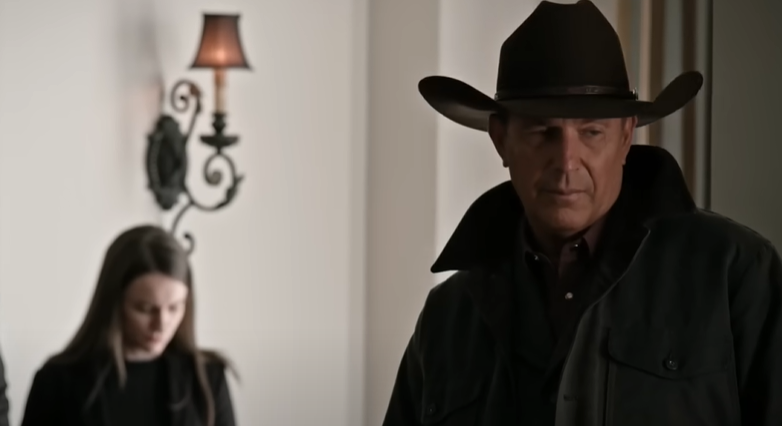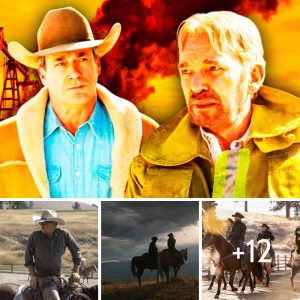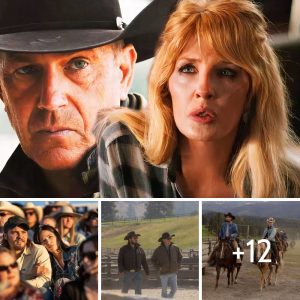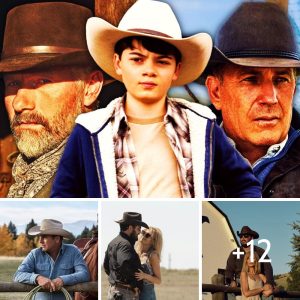In the sprawling, untamed heart of Montana, where the majestic peaks of the Rockies meet the sprawling plains, a perennial struggle for land, legacy, and power unfolds. At the epicenter of this fierce contention stand two formidable figures: John Dutton, the stoic, iron-willed patriarch of the Yellowstone Dutton Ranch, and Thomas Rainwater, the ambitious, Harvard-educated Chief of the Broken Rock Indian Reservation. Their relationship, a volatile cocktail of bitter rivalry, grudging respect, and strategic alliance, forms the very backbone of Paramount Network’s hit drama, “Yellowstone.” This is not merely a tale of property disputes; it is a profound exploration of history, sovereignty, and survival, played out against the breathtaking, yet brutal, backdrop of the American West.
From their very first encounter, the stage was set for an epic clash. What began as a seemingly innocuous issue of stray cattle quickly escalated into a bloody declaration of war. When Dutton’s livestock wandered onto the reservation, Rainwater, newly installed as Chief and eager to reclaim what he believes was stolen, seized them. “Cattle don’t know the difference between your land and ours,” Rainwater’s elder, Felix, observed, “neither did we till the government showed us. Now I guess we’re showing you.” This seemingly simple act was, in fact, a deeply symbolic maneuver, a challenge to centuries of oppression and a reclaiming of ancestral rights. Rainwater, a man forged not in the fields but in the corporate boardrooms of Denver, saw the cattle as a means to an end, a weapon in his broader strategy to restore his people’s heritage and economic independence.
Dutton, accustomed to dominance, reacted with characteristic fury. “God damn it, I just don’t see how anyone gains from all this, Felix,” he barked, his frustration palpable. But Rainwater’s vision transcended mere profit; it was about pride, restitution, and a fundamental shift in the balance of power. The standoff over the cattle spiraled into a deadly confrontation between tribal police, BLM officers, and Montana’s livestock association, leaving three men dead. For Dutton, it was a senseless tragedy. For Rainwater, it was a calculated sacrifice. “He didn’t want cattle,” Dutton later realized with chilling clarity, “He wanted this.” This incident solidified their roles as sworn enemies, each believing the other to be a thief – Dutton, accusing Rainwater of stealing his livelihood; Rainwater, accusing Dutton of stealing an entire continent, symbolized by his “ranch the size of Rhode Island.”
The animosity reached a crescendo when Rainwater unveiled his ultimate ambition: to buy back the entire Yellowstone Valley, beginning with the Dutton Ranch. His Harvard MBA mind, honed in mergers and acquisitions at Merrill Lynch, had crunched the numbers – “fourteen billion to buy it all.” He chillingly informed Dutton of his plan to wait for his death, for the inheritance tax to cripple his children, and then “pull down every fence” until “any evidence that your family ever existed will be removed from the property. It’ll look like it used to, when it was ours.” This wasn’t merely a business transaction; it was a promise of erasure, a reversal of colonial conquest. “I am the past,” Rainwater declared, “catching up with you.” It was a declaration of war on a deeply personal, existential level, one that threatened to obliterate the very foundation of Dutton’s identity.
Yet, in the brutal landscape of Montana, alliances are often forged in the fires of necessity. When external forces – the manipulative Beck Brothers, and later, the predatory Market Equities corporation – began to threaten both the ranch and the reservation, the two nemeses found themselves facing a common, more dangerous foe. “We’ve all played fairly dirty,” Dutton conceded, acknowledging their shared history of ruthless tactics. But, as Rainwater astutely observed, “No one’s attacked my family on behalf of your business, and no one’s attacked yours on behalf of mine.” This was the crucible in which their uneasy truce was forged. Their paths would always collide, and their fight for their respective worlds would continue, but a new enemy emerged, one that “doesn’t play fair” and would “find the thing you care about most and they’ll kill it.”

This realization led to one of the series’ most iconic and disturbing moments: the “blood oath.” Under the cloak of secrecy, Dutton and Rainwater, along with their most trusted enforcers, Rip Wheeler and Mo Brings Plenty, agreed to an unspoken pact. “We should kill him,” Dutton asserted, referring to their shared adversaries. Rainwater, ever the pragmatist, offered a chilling guarantee: “When things get lost on the reservation, they don’t get found. Because most of the time, there’s no one to look. I give you my word, there will be no one to look.” This moment cemented a bond of mutual protection and brutal efficacy, demonstrating that while their ultimate visions for Montana differed, their willingness to employ extreme measures for self-preservation aligned perfectly.
The collaboration deepened as the fight against Market Equities’ proposed airport and city development gained momentum. Rainwater, with his corporate acumen, recognized the developers’ Achilles’ heel: time. “Corporations hate complicated, and they need to see a return. The one thing corporations never have is time. It’s their only enemy.” With this insight, Dutton and Rainwater unleashed their most dangerous weapons: their respective legal and political strategists, Beth Dutton and Angela Blue Thunder. The joint lawsuit, leveraging environmental impact reports and uniting powerful conservation groups, became a formidable obstacle. “We stopped wolf hunting for a fuckin’ decade,” Rainwater scoffed, “what do you think we’re gonna do to an airport?” Their combined might brought the multi-billion-dollar project to a standstill, showcasing their capacity to inflict damage when united.
Perhaps the most significant shift in their dynamic occurred when Dutton assumed the governorship of Montana. Despite their long-standing animosity, Rainwater continued to be a strategic counsel and, at times, a surprising ally. He provided Dutton with crucial information about the attack on his family, allowing Dutton to “get to the bottom of it” and understand who truly sought his demise. This act of trust, though perhaps self-serving in its aim to remove a common threat, underscored a newfound level of cooperation.
The apex of their pragmatic alliance came with the proposed pipeline, a project that threatened both the ranch’s watershed and the reservation’s resources. Rainwater, recognizing the shared peril, advised Dutton to leverage his gubernatorial power. “I don’t want a pipeline,” Rainwater stated, “I want the land. You know I can only imagine you feel the same.” In a stunning public address, Governor Dutton, standing alongside Chief Rainwater, denounced the pipeline, declaring, “running a pipeline beneath the drinking water of an already strained and impoverished community… is not progress at all.” This united front, a powerful display of indigenous sovereignty and state authority, shocked both the corporations and political observers.
The relationship between John Dutton and Thomas Rainwater is a nuanced dance between sworn enemies and reluctant allies. It’s a testament to the idea that common threats can forge the most unlikely bonds. They remain ideological adversaries, with Rainwater’s vision of reclaiming ancestral land constantly clashing with Dutton’s desire to preserve his family’s ranching legacy. Yet, in their shared fight against external forces that seek to exploit Montana, they have found an unshakeable, if unspoken, understanding. Their interactions, steeped in history and veiled in mutual respect, define the very essence of “Yellowstone” – a relentless, brutal, yet ultimately captivating struggle for survival in a land that demands everything.





